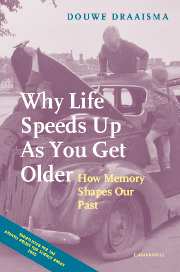Book contents
- Frontmatter
- Contents
- List of illustrations
- Acknowledgments
- 1 ‘Memory is like a dog that lies down where it pleases’
- 2 Flashes in the dark: first memories
- 3 Smell and memory
- 4 Yesterday's record
- 5 The inner flashbulb
- 6 ‘Why do we remember forwards and not backwards?’
- 7 The absolute memories of Funes and Sherashevsky
- 8 The advantages of a defect: the savant syndrome
- 9 The memory of a grandmaster: a conversation with Ton Sijbrands
- 10 Trauma and memory: the Demjanjuk case
- 11 Richard and Anna Wagner: forty-five years of married life
- 12 ‘In oval mirrors we drive around’: on experiencing a sense of déjà vu
- 13 Reminiscences
- 14 Why life speeds up as you get older
- 15 Forgetting
- 16 ‘I saw my life flash before me’
- 17 From memory – Portrait with Still Life
- Index of names
7 - The absolute memories of Funes and Sherashevsky
Published online by Cambridge University Press: 22 September 2009
- Frontmatter
- Contents
- List of illustrations
- Acknowledgments
- 1 ‘Memory is like a dog that lies down where it pleases’
- 2 Flashes in the dark: first memories
- 3 Smell and memory
- 4 Yesterday's record
- 5 The inner flashbulb
- 6 ‘Why do we remember forwards and not backwards?’
- 7 The absolute memories of Funes and Sherashevsky
- 8 The advantages of a defect: the savant syndrome
- 9 The memory of a grandmaster: a conversation with Ton Sijbrands
- 10 Trauma and memory: the Demjanjuk case
- 11 Richard and Anna Wagner: forty-five years of married life
- 12 ‘In oval mirrors we drive around’: on experiencing a sense of déjà vu
- 13 Reminiscences
- 14 Why life speeds up as you get older
- 15 Forgetting
- 16 ‘I saw my life flash before me’
- 17 From memory – Portrait with Still Life
- Index of names
Summary
In one of his labyrinthine stories, the Argentine short-story writer, essayist and poet Jorge Luis Borges (1900–1986) introduces his readers to one Ireneo Funes, whose name translates as ‘out of the dark’. One evening in 1884, the narrator and his cousin get caught up in a storm in Uruguay. The south wind is driving along an enormous slate-coloured storm cloud that has covered the sky. Out of the darkness, a boy suddenly appears. The cousin shouts, ‘What's the time, Ireneo?’ Without looking at a watch or consulting the sky, Ireneo calls back, ‘Four minutes till eight, young Bernardo Juan Francisco.’ ‘Chronometric Funes’ seems to have an infallible sense of time.
When the narrator returns to Uruguay a few years later, he hears that Funes has been thrown from an unbroken horse and been left a hopeless cripple confined to a camp bed. After the fall he appears to have at his disposal two astounding gifts: infinitely detailed powers of observation and an absolute memory. Funes sees, hears and senses everything and forgets nothing. His fall has changed his memory into a perfect register. The narrator decides to call on Funes. While walking across the tiled patio to Funes's room, he hears someone reciting a Latin text. It is Ireneo Funes. The disabled boy has no Latin but has learned the text by heart while lying on his camp bed.
- Type
- Chapter
- Information
- Why Life Speeds Up As You Get OlderHow Memory Shapes our Past, pp. 61 - 72Publisher: Cambridge University PressPrint publication year: 2004
- 1
- Cited by

